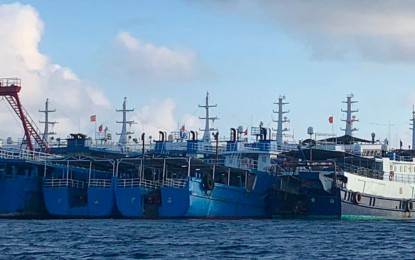
ENHANCED COOPERATION. The enhanced security and defense cooperation between Japan and the Philippines could ease tensions in the West Philippine Sea, according to a political analyst on Saturday (Feb 11, 2023). Professor Froilan Calilung said the plan sends the message to other countries, like the US and China, that the security dimension is not being monopolized by the regional or world superpowers. (PNA file photo)
MANILA — The enhanced security and defense cooperation between Japan and the Philippines could ease tensions in the West Philippine Sea, a political analyst said Saturday.
Froilan Calilung, a political science professor at the University of Santo Tomas, gave this observation after the two countries agreed to discuss “in-depth” issues concerning regional and international situations, including collaboration towards realizing a "free and open Indo-Pacific."
The plan, he said, signals a "very good" message to countries like the United States (US) and China that the security dimension is "not being monopolized by the regional or the world superpowers themselves."
"One of the things that I think is very good here in so far as this event was concerned, is that both the leaders from the Philippines and Japan agree very well on how we could attain iyong tinatawag nating (the so-called) free and open Indo-Pacific, which is very good because that will create or defuse some tensions or potential conflicts away of course from the very contentious issue of the West Philippine Sea," Calilung said during the Saturday News Forum in Quezon City.
"So, maganda iyong mga cooperative patterns na ito (these cooperative patterns are good). What the President we have right now, definitely is more statesman-like," he added.
On Thursday, the Philippines and Japan reaffirmed their defense and security cooperation during the second day of Marcos' working visit to Tokyo.
In a joint statement, Marcos and Japanese Prime Minister Fumio Kishida vowed to strengthen the two nations' defense and security cooperation through "strategic reciprocal port calls and aircraft visits, transfer of more defense equipment and technology, continuous cooperation previously-transferred defense equipment and capacity building."
'Globalization president'
The professor said the Philippines would reap the benefits of Marcos' five-day working visit to Japan, given the "very positive" response from the Japanese government and private leaders.
"We were treated to a lot of economic, investments and even health, tourism aspects that were brought about by this trip. And I think this is very, very positive for the country," he said.
Calilung also praised Marcos for marketing the Philippines well in Japan, and even dubbed the latter as a "globalization president" who "understands the dynamics of globalization."
"He (Marcos) understands very well how bilateral and multilateral integration works, especially in the contemporary world or contemporary setting. He is also very, very articulate regarding his ideas," he said.
"I think this is one of the reasons why many of the world’s countries and leaders would like to meet with him or touch base with him because of his deep sense of understanding. Let us not forget, that whenever we have foreign trips like this or state visits like this, it’s not only us who actually learn and benefit. These other countries also wished to do the same, they also wished to learn from us, a thing or two," Calilung added.
VFA talks
In a radio interview on Sunday, Senator Francis Tolentino said a proposed Visiting Forces Agreement (VFA) with Japan is not new as the two countries already established a relationship since 2006 with the signing of the Japan-Philippines Economic Partnership Agreement (JPEPA).
JPEPA, aimed at increasing trade and investment opportunities between the two economies, was the first bilateral free trade agreement (FTA) for the Philippines after 50 years.
Under JPEPA, the Philippines and Japan agreed to accord national treatment and most-favored-nation treatment to investors.
Tolentino said Japan also provided air and water assets to the Philippines which are now being used to respond to calamities.
“Mayroon tayong joint declaration with Japan kaya may mga donasyon na mga eroplano, patunay na meron na tayong mga ginagawa kahit wala pang VFA with them ( We have a joint declaration with Japan that’s why they donate planes and which means we maintain a relationship with them even if there is no VFA yet),” Tolentino said.
House Speaker Martin Romualdez told reporters in Tokyo that the VFA is a “work in progress” while Senate President Miguel Zubiri said in a statement that while no formal talks have reached Marcos, the President's meeting with Kishida is “an opportune time to finally go into initial talks about the agreement.”
"It makes strategic sense. Japan is an ally, and with ongoing territorial disputes over our waters, we stand to benefit from stronger security cooperation with our allies," Zubiri said. "Japan is already offering vital support to our Coast Guard, not just through vessels and equipment but also through other capacity-building opportunities such as training."
Marcos' visit to Japan has so far resulted in the signing of seven bilateral agreements and 35 investment deals.
He is expected to return to Manila on Sunday. (With a report from Leonel Abasola/PNA)
